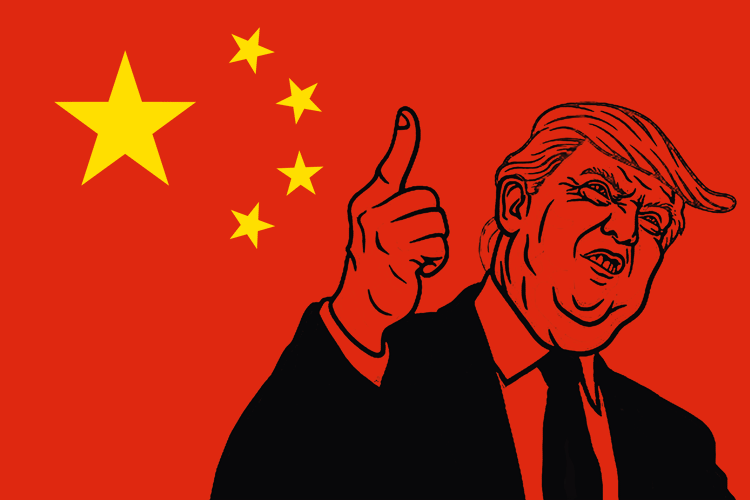
President Trump is at it again – this time he wants to limit Chinese investment in US technology firms.
And of course, right on cue, the media goes into a frenzy about how any limits put on Chinese investors will interfere with international trade and impose higher prices on the American consumer. Most of all, though, they continue to push the following narrative:
Preventing the Chinese from buying equity in U.S. tech firms is contrary to the benefits of free and fair international trade.
As usual, the President is portrayed as someone out of touch with many widely known economic principles – all of which he seems to be violating.
There’s only one small problem with that argument though…
When it comes to China, we do not have fair or free-trade. In fact, it’s not even close to that – let me explain why:
By and large, Chinese companies are not available for purchase by U.S. companies. Sometimes, American corporations have been able to buy a minority interest in Chinese companies in order to gain access to the Chinese markets.
But overall, American companies have not been able to buy into Chinese corporations in a major way due to trade restrictions set by the Chinese.
Meanwhile, Chinese companies have been free to invest as much or as little as they desire, snapping up majority ownership in American companies at will.
These journalists keep saying that Trump is figuratively assassinating free trade, but was it ever really fair to begin with?
No, absolutely not.
The Chinese have been in the driver’s seat for years, able to manipulate American companies as they see fit while the U.S. corporations have had absolutely no recourse.
So at a minimum, in order to continue to allow Chinese companies to invest in American companies, regardless of whether they are involved in industrially significant technology or not, a prudent observer would require China to embrace the same policy allowing American companies to buy a majority interest in Chinese companies.
There’s another small wrinkle in this issue that hasn’t been considered by the mainstream media:
While American companies are privately or publicly owned, Chinese companies are for the most part still owned by the state. So when a Chinese company buys an American company, it’s really the Chinese government buying it.
But is this a bad thing? In theory, Chinese companies are armed with a massive trade surplus and they can afford to overbid on American companies (and typically do), rewarding company shareholders with potentially sizable gains from the sale.
So what’s the problem here?
In reality, China is not a friend to the United States, or much of the western world. At best, they are a political adversary.
At worst, a serious military threat.

Don’t forget – only 13 years ago China threatened to nuke the United States if American forces defended Taiwan from a Chinese attack. It would be woefully irresponsible for the U.S. to allow state run Chinese companies to buy up American companies (tech firms included) that are vital to U.S. national security.
The fact of the matter is that the United States has the most powerful military in the world – and we didn’t reach that point by accident. The prowess of U.S. owned companies is what caused this to happen, not foreign ownership or foreign technology.
So now that we’ve established how important continued domestic ownership of American companies is, let’s do a little thought experiment:
What if China was allowed to buy all U.S. companies?
Commercially, that might not be an issue. But from a national security standpoint, it could be potentially devastating.
During the Cold War between the U.S.S.R. and the United States, America did not allow Soviet state-run companies to buy a U.S. company of any kind.
Sounds like common sense, right?
The same principle applies to China today. And so, who understands this better than anyone else?
The leader of the free world – Donald Trump.
And the timing of these restrictions could not be better as Trump continues to pressure the Chinese to embrace fair trade practices with the threat of tariffs.
So as long as China remains a U.S. adversary, the “fair and free” international trade that they’ve been enjoying for so long will be put on hold. But I can hear you saying now:
“Isn’t this going to have a negative impact on the value of U.S. companies by removing a willing well-heeled buyer from the market?”
Any such impact, in my opinion, will be short-term. If, for example, China was blocked from buying a U.S. company, the Chinese company would not typically be the only one bidding on it. The American company would simply be sold to another U.S. or European firm.
My point is that the Chinese companies are not the only ones bidding on American firms. In fact, they are just one of many.
Besides – the valuation of U.S. tech companies is ultimately based on profits, and profits are based on a company’s ability to produce new products that compete in the general marketplace.
So the impact on market valuations by restricting the Chinese from buying U.S. companies, I believe, is transitory at best and longer-term of no consequence.
And should any technology-based company’s stock price drop in the near-term as a result of these restrictions, I would regard that as a buying opportunity – because there would likely be other buyers anyway and the market would soon disregard such restrictions.








